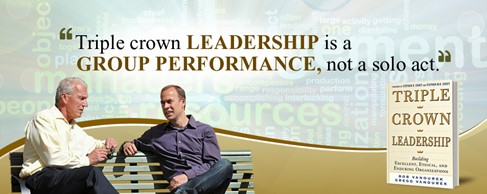Early in my business career, I was a loner. I worked hard and was polite to others, but I never connected with colleagues. I never opened up to reveal what I was feeling. It was all business. I kept my head down and “nose to the grindstone.” Since I had done well in college and grad school that way, I just carried it on. I never gave much thought about why I should relate more deeply to other people. That approach was a failure. Leaders can’t be loners.
Since I was a loner, all the work I did fell on me. As a classic overachiever, I could do a lot if I threw himself into the work, but the amount of work to be done was always infinite. I had no one to share the load; no one to bounce ideas off; no one to give me some feedback or encouragement. Unfortunately, I was alone at work and thought that was how the world operated.
My personality wasn’t naturally social. I also had a speech impediment: I stuttered. It felt painfully embarrassing to me then. So, it was more comfortable to work alone and then go home to my family. I knew they cared for me. Others? I wasn’t sure.
But I was also fascinated by leadership. Ever since I was thrust into leadership positions in high school sports, I aspired to be a leader.
Back in those days, leaders weren’t involved with their colleagues. They were distant, aloof, especially in business. Clearly, they couldn’t be buddies with people they supervised. They might have to discipline them or terminate them. Better to keep your distance. I wanted to lead but sensed this conventional approach to leading wasn’t right.
My Rude Awakening: Leaders Can’t Be Loners
I became an executive in my late 20s and had a shock one day from a young receptionist named Roz. At the time, I was president of a small company and each morning said “hello” to Roz as I passed her desk.
One morning, she said, “Mr. Vanourek, can I ask you a question?”
“Of course, Roz,” I said.
“Well, each morning you walk past and say hello, but you’re always looking down, and you look so serious and intense. I wondered if there’s anything wrong at the company, and if I should look for another job?”
Look for another job? The company was thriving. My face, I then realized, was stern, perhaps even mean-looking. I had little eye contact with Roz. My communications with people were brief and seldom personal. They were business-like, not warm and friendly. Just the facts. The impression I had created with people was negative.
To this day, I marvel at young Roz’s courage to ask her question. What a teachable moment it was for me, even now as I relate it decades later.
I assured Roz that everything was fine. She stayed in her job, and I slowly started to climb out of my self-imposed shell. I began to connect with people, but it was still not enough.
Coming into the Light

A couple of years later, a wonderful leader I worked for briefly, Jan Erteszek, introduced me to the essays of Robert Greenleaf on “servant leadership.” According to this approach, the only people who can determine if someone is a leader are those who willingly follow. They don’t just comply because someone has authority or power over them. Why would people willingly follow someone else? Because they believe that person will serve them.
At the heart of servant leadership is relationships. It’s not about you. To the contrary. It’s all about them, your colleagues, the employees who report to you, and your customers and vendors. And it’s all about the people you impact in this world, either with a scowl or a smile on your face.
To serve them, you have to know them. Do you truly care about them, their happiness, their families, their development as human beings? Or are they just there as a means to your ends—to do their jobs and then be rewarded or reprimanded by you?
One CEO I worked for later in life, George Harvey at Pitney Bowes, said it best:
“Business, leadership, life are all about relationships.”

If you want to live in this world, let alone succeed in it, then you need to be in relationship with others. Human beings were made to be in relationships, in community with each other. True relationships, caring relationships, trusting relationships, built on integrity, authenticity, shared purpose, values, and goals.
Virtually everything worthwhile in life has been created or built by groups of people, not loners who were entirely self-reliant. Yes, the entrepreneur may be the catalyst, the genius, the idea generator. But the execution and scale-up depend on committed, passionate colleagues who catch the pass the quarterback throws and run and block their way into the end zone. It takes a team for virtually all significant achievements in this world.
The loner quickly peaks out. There’s no one there to help, or ask, or challenge your bad ideas. To bring the expertise or insights you’re missing. No one there to share the moment of achievement, or the sadness of failure, before you try again. It’s lonely.
The Wonder of Relationships

I slowly learned that relationships, meaningful relationships, are built on truly caring for others. They’re not built on slick persuasion or manipulation. They’re built on authenticity, honesty, vulnerability, and genuine caring. Numerous long-term studies of happiness and longevity conclude relationships are the key to both.
Whether it’s community, partnership, friendship, teamwork, or marriage and family, it all involves relationships.
I learned that it comes back to committed, caring relationships with my soulmate and family. It comes back to a few trusted friends who would go the distance with me under any circumstances.
It comes back to trusted, committed colleagues at work. I learned so much from them. With them, there was virtually nothing we could not achieve together. No matter how hard the challenges, working with my trusted colleagues was the best time of my career by far.
The loner can learn to open up and connect. I did. Over time, I overcame my speech challenges. I didn’t discard my personality or natural tendencies, but I did learn to work through some of my fears and insecurities, pushing myself to connect more and finding better ways to do it that were comfortable for me.
My colleagues, friends, and especially my soulmate, June, helped. Thankfully, my life changed. My world blossomed. I learned to be a better person and a servant leader.
Have you been a loner? I encourage you to commit to truly caring about and serving others in deep, authentic relationships. It was a wondrous discovery for me. Leaders can’t be loners.
– Bob Vanourek

Leadership Derailers Assessment
Take this assessment to identify what’s inhibiting your leadership effectiveness. It will help you develop self-awareness and identify ways to improve your leadership.
Tools for You
- Leadership Derailers Assessment to help you identify what’s inhibiting your leadership effectiveness
- Personal Values Exercise to help you determine and clarify what’s most important to you
- Alignment Scorecard to help you assess your organization’s level of alignment
Related Articles
- “The Power of Relationships in Our Lives“
- “The Problem of Going It Alone“
- “The Most Important Contributor to Happiness“
Post Script
P.S. from Gregg Vanourek – In this post, Bob’s talking about the problem of being a loner, not the issue of being an introvert or extravert. That’s a separate issue. There are many books and other resources on that topic, including:
- Susan Cain, Quiet: The Power of Introverts in a World That Can’t Stop Talking
- Jennifer Kahnweiler and Douglas Conant, The Introverted Leader: Building on Your Quiet Strength
- David Rock, Quiet Leadership: Six Steps to Transforming Performance at Work
- Video: “Why Introverts Just Might Be the Best Leaders,” Susan Cain
- Podcast: “648: Susan Cain: Introverts Unite for a Quiet Revolution,” The Jordan Harbinger Show

++++++++++++
Bob Vanourek and Gregg Vanourek are leadership practitioners, teachers, trainers, and award-winning authors. They are co-authors of Triple Crown Leadership: Building Excellent, Ethical, and Enduring Organizations, a winner of the International Book Awards. Check out their Leadership Derailers Assessment or join their community and sign up for their newsletter. If you found value in this, please forward it to a friend. Every little bit helps!

